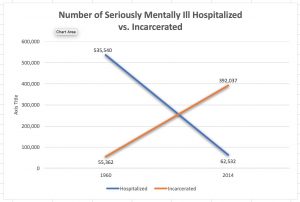Quick Guide to most important ways Federal Government can help the most seriously mentally ill
Background: It is unfortunate, but true that some of the most seriously mentally ill (SMI), unlike people with less severe “mental health issues” often hallucinate, are delusional, psychotic, and can’t think straight (cognitive impairment). It is unfortunate, but true, that some need periodic hospital care, a small group will never recover, and some as a result of hallucinations, delusions, cognitive impairments and anosognosia, are unwilling or unable to stay in treatment on their own even when available and offered to them. Put another way, if you “know” you are the Messiah, the last thing you want is treatment.
The first responsibility of government mental health policy should be to help the most seriously ill, rather than all others. Pretending these issues don’t exist is causing massive homelessness and incarceration of the seriously ill, yet federal legislation always tends to focus on higher functioning, and/or less important issues like trying to identify the asymptomatic, fighting stigma, etc. Following are specific policies that would help persons with the most serious mental illnesses.
|
Policy |
Which seriously mentally ill does it help? |
How it helps
|
| Fund Assisted Outpatient Treatment
AOT is a court-ordered requirement to stay in six months of mandated and monitoredcommunitytreatment. |
AOT helps a very small but important group of the most seriously ill who because of inability or unwillingness to stay in treatment already accumulatedmultiple incidents of homelessness, arrest, violence, incarceration, or hospitalization after being offered voluntary services that were made available to them. This small group, because of their known history, is the most likely to again become hospitalized, homeless, arrested, incarcerated and possibly violent. Note: AOT is not an alternative to community services. AOT is a way to help the seriously ill access community services. | Extensive replicated research shows AOT helps SMI stay in existing community treatment and avoid expensive and rights-depriving inpatient commitment and incarceration.
· 74% fewer participants experienced homelessness · 77% fewer experienced psychiatric hospitalization · 83% fewer experienced arrest · 87% fewer experienced incarceration · 81% said AOT helped them get and stay well · Reduces hospitalization/incarceration costs 50%. |
| Repeal IMD Exclusion
IMD Exclusion prevents Medicaid from helping mentally ill adults who need hospitalization.
|
IMD Repeal would help a small group of the most seriously mentally ill who even if there were perfect community services cannot survive safely in the community because medications and other treatments do not work for them or they require the much more intensive support than the higher functioning. The IMD Exclusion prevents reimbursement for this care and is federally sanctioned discrimination against the seriously ill. It affects no other group and should be eliminated. |
Hospitals reduce incarceration
|
| Remove “HIPAA Handcuffs”
HIPAA is a privacy law |
HIPAA reform would help seriously mentally ill who have families willing to provide housing, case management, and financial support to them. But HIPAA prevents families from being told the diagnosis, what medications and rehabilitation is needed, and therefore cannot see prescriptions are filled and transportation arranged. | By giving Moms and Dads who provide care out of love the same information that paid providers receive, parents can prevent their relatives from becoming too psychotic to keep at home and from becoming a government responsibility. |
| Eliminate or Reform SAMHSA
SAMHSA sets national policy and distributes federal funds. |
SAMHSA elimination would help the most seriously ill who need help based on the scientific “medical model” rather than the SAMHSA-invented “recovery model” which requires patients to self-direct their own care something some of the most seriously ill cannot do. | SAMHSA elimination would free states of the SAMHSA-instituted obligation to use Mental Health Block Grants for people without mental illness and curtail SAMHSA funded consumer trade associations from lobbying against hospitals and other treatments that help the most seriously ill. It would stopSAMHSA funding antipsychiatry, thecertification of programs that do not have independent evidence, etc. This would save taxpayers money while helping SMI get care. The few useful programs can be transferred to CDC, NIMH, IOM, etc. |
| Require PAIMI to focus on abuse and neglect | Persons with serious mental illness who have been subjected to “abuse or neglect.” | PAIMI mainly focuses on ‘freeing’ the non-seriously ill from care, not helping the seriously ill access it. Threat of suitsprevents states and hospitals from helping the seriously ill. Focusing PAIMI on abuse and neglect would reduce both. |
Prepared by Mental Illness Policy Org. 5/14/15 mentalillnesspolicy.org

